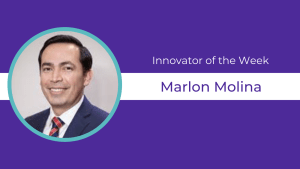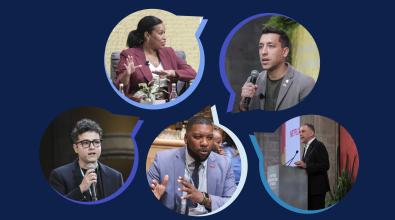Bringing a community organizer's perspective to City Hall innovation

Name: Marlon Molina
Title: Deputy Commissioner, Planning & Community Development
City: Mount Vernon, N.Y.
Marlon Molina has always brought his passion as a community organizer to his leadership role in the New York City suburb of Mount Vernon. But he says the innovation training offered through the Bloomberg Harvard City Leadership Initiative made him realize just how valuable his ties to the grassroots needs and wants of his community really are.
Molina started his career as a tenant organizer in the South Bronx in the 1990s, then worked at a New York City-wide organization that provided grants and technical assistance to community groups. “Now, I’m in a leadership position in a municipality, but I still have the perspective of my community-organizing days,” he says, adding that he always keeps reminding himself: “What is the impact that the program is going to have on the community?”
Mt. Vernon’s focus, coming out of the innovation training, has been on the endemic problem of littering, with a citywide team encompassing the departments of public works, recreation, and planning, along with the assessor’s and mayor’s office, joining together to find solutions. While prototyping solutions, they’ve engaged renters and homeowners of all ages and neighborhoods, Molina says.
These conversations led to the insight that neighbors generally don’t know one another as well as they once might have, and a suggestion of cleanup activities during which neighbors would both pick up litter and get to know one another better.
When placing extra garbage cans on the sidewalk did not visibly change the littering problem, project leaders had another insight: “You have to change people’s perception that it’s OK to litter,” Molina says. “As we started to evaluate what could be a more permanent solution, we arrived at the fact that changing the attitude of the next generation should be at the center of this program.”
In response, the citywide team has rolled out two initiatives: Own Your Zone, through which neighbors will undertake litter cleanups with support from the Department of Public Works; and the School Environmental Impact Program, which will recruit students and their parents to monitor litter in areas surrounding schools. Separate teams of city staff will support each program.
Beyond supporting the anti-litter campaigns, innovation training has provided a skillset to city staff based on inclusive community feedback and resulting data gathering, Molina says. “It’s a discipline that we’ve learned,” he says. “We can use the data to design programs that are more impactful.”
The human-centered design concept is central to all of this, Molina says. “How many people it affects, whether negatively or positively, you have to measure that. If you have something effective, you double down. If not, go back to the drawing board,” he says. “If it doesn’t ultimately improve people’s lives, it’s just innovation that happened in a vacuum.”
Pro tip: “Whenever a new program is created, or whenever an existing program is modified, always keep in mind how the end user will be affected.”

